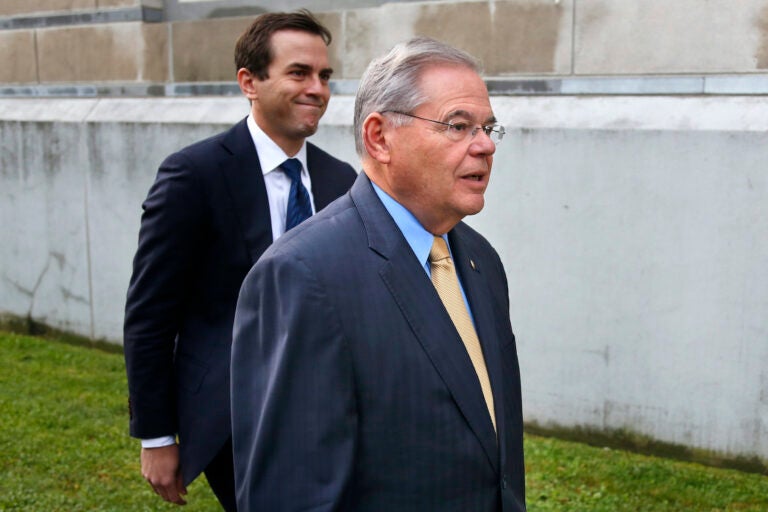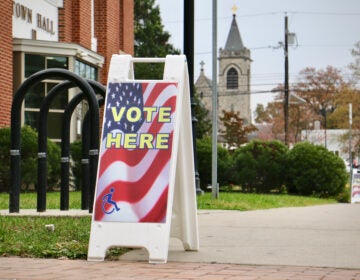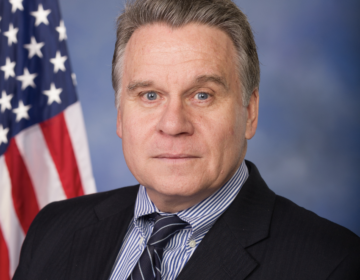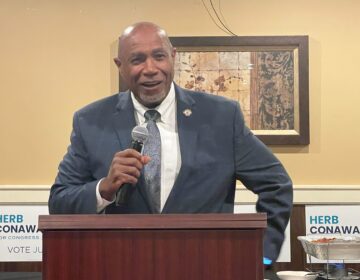What to expect in the New Jersey presidential and state primaries
The prospect of Sen. Bob Menendez's seat being open has already had cascading effects in the state.

FILE - Sen. Bob Menendez, right, walks with his son Robert Menendez Jr., in Newark, N.J., Sept. 6, 2017. (AP Photo/Seth Wenig, File)
Voters in New Jersey on Tuesday will choose candidates vying to replace Democratic Sen. Bob Menendez, who is on trial in federal court in New York on corruption charges and has opted not to run in the state’s Democratic primary.
Menendez, who has held the seat for more than 18 years, filed to run as an independent candidate on Monday, the day before the primary. He had previously said he would consider running as an independent if he is acquitted.
Presidential primaries will also be on the ballot, along with primary elections for U.S. House.
While Menendez’s reentry into the race could complicate Democratic efforts to retain the Senate seat, his decision not to run in the party primary has already had cascading effects in the state. The early jockeying between first lady Tammy Murphy, who has since suspended her campaign, and front-runner Rep. Andy Kim led to a ruling that eliminated the party line for at least the primary. The party line is a ballot design specific to New Jersey that displays candidates endorsed by county parties in one column, which opponents argue creates an advantage for party-backed candidates.
With the party line gone, Kim has appeared to consolidate support statewide. He faces labor leader Patricia Campos-Medina and activist Lawrence Hamm in the primary.
On the Republican side, the Senate primary is among four candidates: hotelier and leading Republican fundraiser Curtis Bashaw, Navy veteran Albert Harshaw, former Tabernacle Deputy Mayor Justin Murphy and Mendham Borough Mayor Christine Serrano Glassner. Serrano Glassner has been endorsed by former President Donald Trump.
In running for the Senate, Kim is vacating the 3rd Congressional District seat he’s held since 2019. The race to replace him has drawn five Democratic candidates. Kim ousted the Republican incumbent in that district in the 2018 in one of the midterms’ closest races, but the district has since been redrawn post-census to be more favorable for Democrats, so the candidate who emerges from the primary is likely to be favored in the fall.
The other U.S. House race to watch is in the 8th District, where first-term Rep. Rob Menendez, son of the current senator, faces a tough challenge from Hoboken Mayor Ravi Bhalla. Bhalla has nearly matched Menendez in fundraising, with $1.625 million to the incumbent’s $1.642 million, in the New York City suburban district.
Trump, a Republican, and President Joe Biden, a Democrat, unofficially sealed their parties’ nominations on March 12. They are both on the ballot on Tuesday and can earn more delegates. For Trump, Tuesday marks the first primaries since he became the first former American president to be convicted of felony crimes.
New Jersey holds its gubernatorial and state legislative elections in odd years, so there are only federal races in this primary.
Here’s a look at what to expect on primary night:
Primary Day
The New Jersey state and presidential primaries will be held Tuesday. Polls close at 8 p.m. ET.
What’s on the ballot
The Associated Press will report vote totals for the Democratic presidential primary, as well as 19 contested primaries for U.S. Senate and U.S. House. Trump is running unopposed in the Republican presidential primary so vote totals will not be reported. The Democratic ballot includes Biden, anti-abortion activist Terrisa Bukovinac and, in most counties, an uncommitted option.
Who gets to vote
Registered party members may vote only in their own party’s primary. In other words, Democrats can’t vote in the Republican primary or vice versa. Independent or unaffiliated voters may participate in either primary.
Delegate allocation rules
New Jersey’s 126 pledged Democratic delegates are allocated according to the national party’s standard rules. Twenty-eight at-large delegates are allocated in proportion to the statewide vote, as are 14 PLEO delegates, or “party leaders and elected officials.” The state’s 12 congressional districts have a combined 84 delegates at stake, which are allocated in proportion to the vote results in each district. Candidates must receive at least 15% of the statewide vote to qualify for any statewide delegates, and 15% of the vote in a congressional district to qualify for delegates in that district.
There are 12 delegates at stake in the Republican presidential primary. All delegates will be awarded to the winner of the statewide vote. Most states that hold primaries within 45 days of the national convention agreed that their delegates would not be bound to any particular candidate, per Republican National Committee rules. However, New Jersey chose to keep its delegates bound, prompting the RNC to cut its total delegate count from nearly 50 to just 12.
Decision notes
In the presidential race, the first indications that Biden is winning statewide on a level consistent with the overwhelming margins seen in most other contests held this year may be sufficient to determine the winner.
There is an effort to get Democratic voters to vote for “Uncommitted” to protest Biden’s policies on the Israel-Hamas war in Gaza. Uncommitted will be on the ballot across the state except for a portion of Ocean County, where supporters didn’t field enough delegates.
In the 8th Congressional District, the key county to watch will be Hudson. Bhalla is currently the mayor of the county’s fourth-largest municipality, so his margin in that county will be important to his overall performance in the district. The district also includes of Essex and Bergen counties.
In the 3rd Congressional District, most of the votes will come from Burlington County. The district also includes parts of Mercer and Monmouth counties.
The AP does not make projections and will declare a winner only when it’s determined there is no scenario that would allow the trailing candidates to close the gap. If a race has not been called, the AP will continue to cover any newsworthy developments, such as candidate concessions or declarations of victory. In doing so, the AP will make clear that it has not yet declared a winner and explain why.
New Jersey allows absentee ballots postmarked by election day to arrive up to six days later, so the number of absentee ballots cast in the primary will not be known until June 10. A close contest in which the number of absentee ballots could impact the outcome could delay a race call.
New Jersey does not have automatic recounts, but candidates and voters may request and pay for them. The cost of the recount is refunded if the outcome changes.
What do turnout and advance vote look like
As of May 1, there were 6,549,568 registered voters in New Jersey. Of those, 38% were Democrats and 24% were Republicans.
In the 2022 primary election, turnout was about 7% of registered voters in the Democratic primary and 5% in the Republican primary. In that election, 49% of ballots cast in the Democratic primary and 20% of ballots cast in the Republican primary were cast before election day.
As of May 28, a total of 247,807 people had cast ballots before Election Day. About 77% of these ballots were cast in the Democratic primary and 23% in the Republican primary.
How long does vote counting usually take?
In the 2022 primary, the AP first reported results at 8:04 p.m. ET, or four minutes after polls closed. The election night tabulation ended around 2 a.m. ET with about 90% of total votes counted.
Are we there yet?
As of Tuesday, there will be 41 days until the Republican National Convention in Milwaukee, 76 days until the Democratic National Convention in Chicago and 154 until the November general election.

Get daily updates from WHYY News!
WHYY is your source for fact-based, in-depth journalism and information. As a nonprofit organization, we rely on financial support from readers like you. Please give today.





